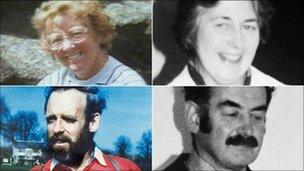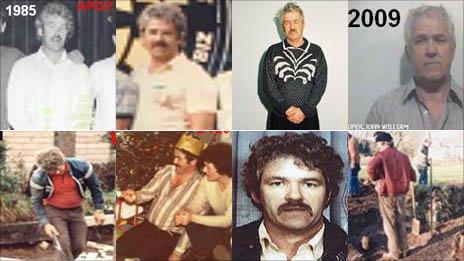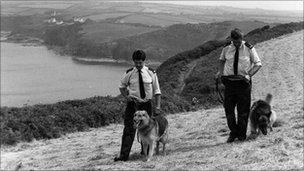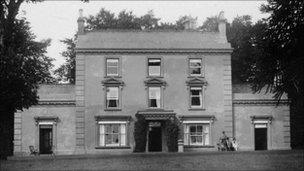John Cooper guilty of two Pembrokeshire double murders
- Published
John Cooper was jailed for life at Swansea Crown Court on Thursday
A labourer who evaded justice for decades over two Pembrokeshire double murders has been jailed for life.
John Cooper was convicted of the 1985 murder of brother and sister Richard and Helen Thomas, and Oxfordshire couple Peter and Gwenda Dixon in 1989.
Cooper, 66, from Letterston, was also convicted of separate charges of rape, sexual assault and attempted robbery.
After an eight-week trial, the Swansea Crown Court jury convicted Cooper of what the judge called "evil" murders.
Mr Justice John Griffith Williams said Cooper was "a very dangerous man, highly predatory who, but for advances in forensic science, may well have continued to evade capture."
As the judge described how terrified the victims must have been, Cooper interrupted.

John Cooper had denied killing Peter and Gwenda Dixon [both left] and Richard and Helen Thomas
He shouted: "This is utter rubbish, it's rubbish. That jury's been on the internet. I don't blame them - evidence has been kept from that jury."
The judge warned Cooper he would be taken downstairs if he did not keep quiet.
Cooper remained in court as the judge completed his statement before passing a life sentence.
He told him: "The murders were of such evil wickedness that the mandatory sentence of life will mean just that."
He concluded: "You are a very dangerous man, a significant risk of serious harm."
When prosecuting barrister Gerard Elias QC read out the victim impact statements, Cooper's family walked out of court, many of them in tears.
As they left, Cooper's brother shouted: "We're here for you, John."
The two sets of murders gave rise to much speculation, and at one time there was a theory that the Dixons were killed because they came across a cache of IRA weapons.
During his police interviews, Cooper continued to claim he was an innocent man
After the hearing, the Dixons' children, Tim Dixon and Julie Ann Pratley, paid tribute to their parents, calling them "loving, gentle and charismatic".
They also paid tribute to the work of the police, saying the people of Pembrokeshire owed them a "debt of gratitude".
"They had wisdom, humour and were compassionate. Even after two decades their absence is immense and still painful," they said.
The Thomas family said their loss had "deepened" over the years.

Pictures released by Dyfed-Powys Police show John Cooper through the years
In a statement issued through police, they said: "As a family, we would wish that justice is done for Richard and Helen. Memories will remain with us all forever but we hope that we will now be able to remember the happier times more than the very sad ones."
The court was previously told that Cooper shot the Thomases at their remote mansion near Milford Haven, Pembrokeshire.
Gerard Elias QC, prosecuting, told the court that on the evening of 22 December 1985, Mr Cooper targeted their three-storey farmhouse at Scoveston Park, possibly knowing Mrs Thomas, 54, was home alone.
Setting fire
During interviews conducted by police in June 2008, he denied having been anywhere near the house.

The judge said Cooper may have evaded capture but for forensic advances
Disturbed by the return of her 58-year-old brother, it is claimed the defendant shot them both before pouring diesel around the house and setting fire to it.
Three and a half years later, on 29 June 1989, Mr and Mrs Dixon were shot at close range while taking a final walk along the Pembrokeshire coastal path near Little Haven before returning to their Witney home.
The court heard Cooper intercepted the couple in daylight, took them to a nearby hideaway and demanded details about their bank cards.
Again using a shotgun, it was claimed Cooper "silenced them forever".
Mr Elias said the killer "took time to create a screen from foliage" to conceal the bodies.
Mr Dixon, 51, was found with his hands tied behind his back. He had been shot three times and his 52-year-old wife twice.
Prof Canter was called in to help solve the murders of Peter and Gwenda Dixon
His bank card had been taken and money was accessed from his account using the correct pin number following his death.
Mr Elias said that on 6 March 1996, the defendant approached five teenagers aged 15 and 16 walking through fields by the Mount Estate School, Milford Haven.
'Most terrifying of ordeals'
The court heard he pulled out a double-barrelled shotgun and forced them all to lie face down on the ground.
He dragged one 16-year-old girl by the hair and raped her at knifepoint. He then indecently assaulted a 15-year-old girl before threatening the teenagers and firing the shotgun in the air.
Mr Elias said each of the three incidents "involved the use of cold, calculating violence" and two of them "the merciless execution of four people".
He said: "All the victims were subjected to the most terrifying of ordeals."
Mr Elias said each incident was "linked by a large number of common threads". Each involved a shotgun, ropes, and a balaclava, and they all occurred in a small part of Pembrokeshire, he said.

Scoveston Park before it was set on fire after Richard and Helen Thomas were killed
He said it was "obvious" the crimes were the work of someone "who knew the area like the back of his hand".
He said Mr Cooper "was a local man that lived in a house at the very epicentre of these offences for many years".
He added that during this 10-year period, Mr Cooper was committing a series of other burglaries and a robbery which also involved a shotgun.
In December 1998, Mr Cooper was jailed for 16 years at Swansea Crown Court for 30 counts of burglary and a robbery, serving 10 years.
Mr Elias said police forces routinely re-examined unsolved murder cases and in early 2006 "a cold case" review into the murders was set-up.
Week In Week Out has a special half-hour programme on the case on BBC One Wales on Thursday, 1900 BST, and there is also an Eye on Wales special on BBC Radio Wales at 1840 BST.
- Published26 May 2011
- Published26 May 2011
- Published26 May 2011
- Published26 May 2011
- Published26 May 2011